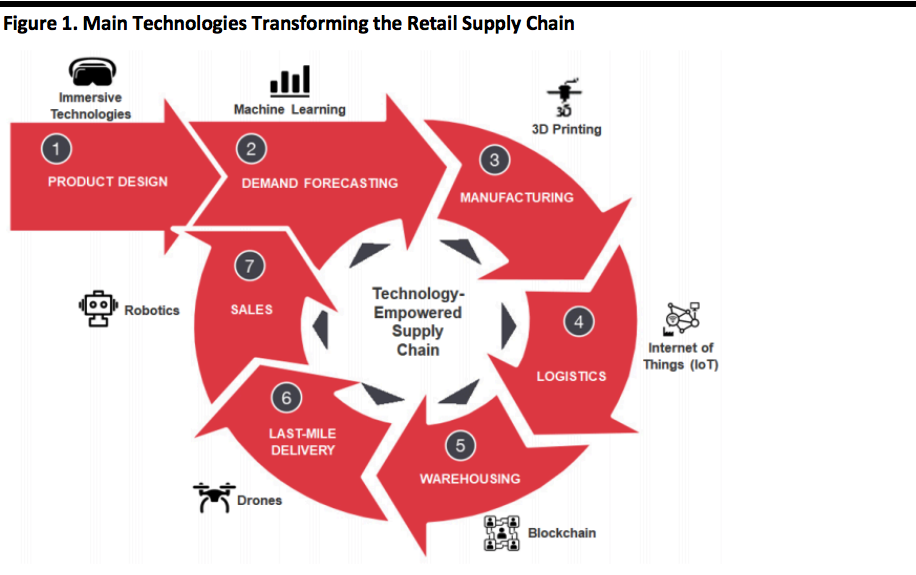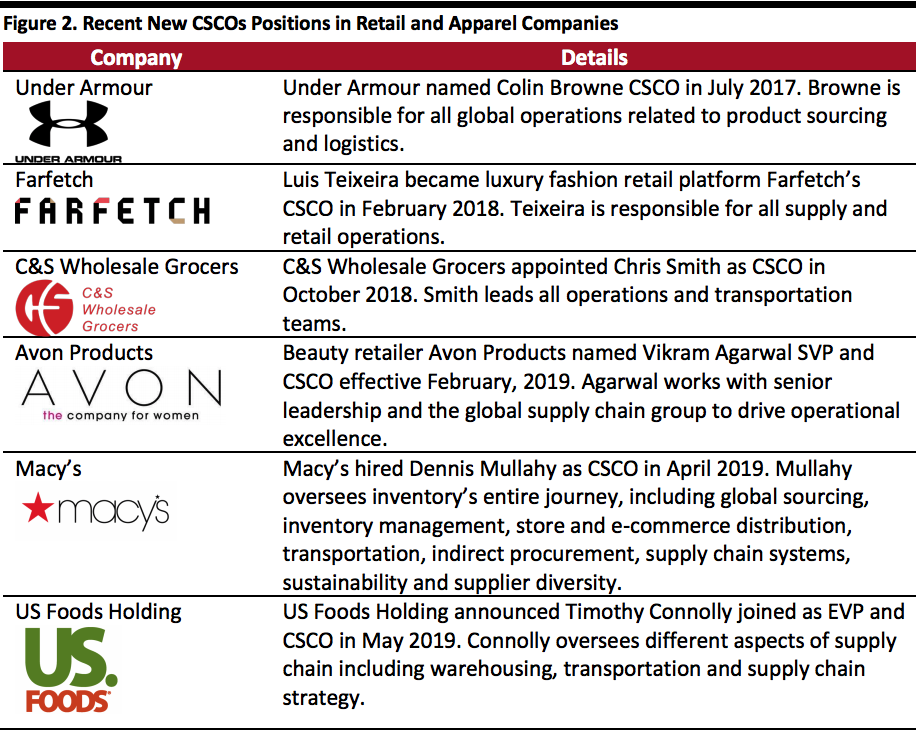
Nitheesh NH
Below, we illustrate the seven major components of the retail supply chain, and some of the technologies that can support processes at various stages – from product design to end consumer.
[caption id="attachment_95005" align="aligncenter" width="700"] Source: Coresight Research[/caption]
What is a CSCO and What Do They Do?
CSCO is a relatively new c-suite position that reports to the company CEO and is responsible for all supply chain processes, from product innovation to delivery. CSCOs look across all supply chain functions, seek to understand how they interact with other parts of the business and how they can be leveraged to support the corporate strategy.
Increasing Importance of Supply Chain Driving the Need for CSCOs
According to Fortune magazine, companies ranging from e-commerce retailers to established Fortune 500 corporations are adding CSCOs to their executive rosters, as they recognize the increasing importance of supply chain on global business decisions. According to research firm CB Insights, mentions of “supply chain” have been steadily rising on company earnings calls between 2008 and 2019 year-to-date.
We think there are several reasons supply chain is growing in importance, which is driving the CSCOs trend:
Source: Coresight Research[/caption]
What is a CSCO and What Do They Do?
CSCO is a relatively new c-suite position that reports to the company CEO and is responsible for all supply chain processes, from product innovation to delivery. CSCOs look across all supply chain functions, seek to understand how they interact with other parts of the business and how they can be leveraged to support the corporate strategy.
Increasing Importance of Supply Chain Driving the Need for CSCOs
According to Fortune magazine, companies ranging from e-commerce retailers to established Fortune 500 corporations are adding CSCOs to their executive rosters, as they recognize the increasing importance of supply chain on global business decisions. According to research firm CB Insights, mentions of “supply chain” have been steadily rising on company earnings calls between 2008 and 2019 year-to-date.
We think there are several reasons supply chain is growing in importance, which is driving the CSCOs trend:
 Source: Company reports/Coresight Research[/caption]
How Can CSCOs Benefit Companies?
CSCOs can benefit companies in many ways, including:
Source: Company reports/Coresight Research[/caption]
How Can CSCOs Benefit Companies?
CSCOs can benefit companies in many ways, including:
 Source: Coresight Research[/caption]
What is a CSCO and What Do They Do?
CSCO is a relatively new c-suite position that reports to the company CEO and is responsible for all supply chain processes, from product innovation to delivery. CSCOs look across all supply chain functions, seek to understand how they interact with other parts of the business and how they can be leveraged to support the corporate strategy.
Increasing Importance of Supply Chain Driving the Need for CSCOs
According to Fortune magazine, companies ranging from e-commerce retailers to established Fortune 500 corporations are adding CSCOs to their executive rosters, as they recognize the increasing importance of supply chain on global business decisions. According to research firm CB Insights, mentions of “supply chain” have been steadily rising on company earnings calls between 2008 and 2019 year-to-date.
We think there are several reasons supply chain is growing in importance, which is driving the CSCOs trend:
Source: Coresight Research[/caption]
What is a CSCO and What Do They Do?
CSCO is a relatively new c-suite position that reports to the company CEO and is responsible for all supply chain processes, from product innovation to delivery. CSCOs look across all supply chain functions, seek to understand how they interact with other parts of the business and how they can be leveraged to support the corporate strategy.
Increasing Importance of Supply Chain Driving the Need for CSCOs
According to Fortune magazine, companies ranging from e-commerce retailers to established Fortune 500 corporations are adding CSCOs to their executive rosters, as they recognize the increasing importance of supply chain on global business decisions. According to research firm CB Insights, mentions of “supply chain” have been steadily rising on company earnings calls between 2008 and 2019 year-to-date.
We think there are several reasons supply chain is growing in importance, which is driving the CSCOs trend:
- As customers come to expect faster lead times and tailored experiences – and technology makes these more possible than ever before – the supply chain is getting more complex and globalized, but also offers more opportunities for those who get it right.
- Recent trade tensions between the US and China have underscored the need for companies to diversify sourcing, which lowers the risk profile but makes the supply chain even more complex.
- Companies are using speed to market as a competitive differentiator, which further adds to the importance of tight supply chain management.
 Source: Company reports/Coresight Research[/caption]
How Can CSCOs Benefit Companies?
CSCOs can benefit companies in many ways, including:
Source: Company reports/Coresight Research[/caption]
How Can CSCOs Benefit Companies?
CSCOs can benefit companies in many ways, including:
- Greater efficiency by finding ways to make companies leaner, such as leveraging advancements in AI and other technology to enhance supply chain management.
- Connect disparate parts of a business acting as a key point of contact to link different parts of the business that may otherwise not interact, while also contributing expertise on supply chain issues.
- CSCOs need to be able to speak the language of the CEO: Many insiders may be so close to their work they rely heavily on supply chain jargon, and may not realize others cannot necessarily understand it. A good CSCO needs to be able to speak the CEO’s language, not only avoiding complex jargon but also explaining the impact of supply chain decisions on the company’s operations, objectives and business performance.
- CSCOs need to be able to think digital: Digitalization is at the core of modern supply chain strategy, so a CSCO needs to be able to think digitally, know how to integrate digital into operations and be familiar with new tools such as smart warehouses, robotics and drones.